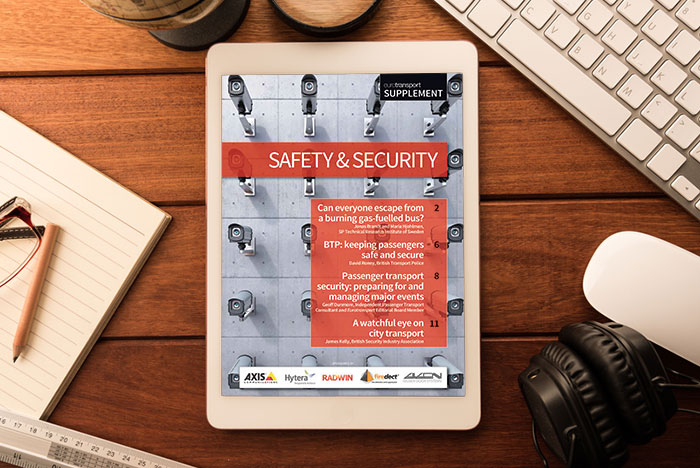Safety & Security supplement 2014
- Like
- Digg
- Del
- Tumblr
- VKontakte
- Buffer
- Love This
- Odnoklassniki
- Meneame
- Blogger
- Amazon
- Yahoo Mail
- Gmail
- AOL
- Newsvine
- HackerNews
- Evernote
- MySpace
- Mail.ru
- Viadeo
- Line
- Comments
- Yummly
- SMS
- Viber
- Telegram
- Subscribe
- Skype
- Facebook Messenger
- Kakao
- LiveJournal
- Yammer
- Edgar
- Fintel
- Mix
- Instapaper
- Copy Link
Posted: 30 April 2014 | Intelligent Transport | No comments yet
In our latest free-to-view Safety & Security supplement, fire researchers from the SP Technical Research Institute of Sweden assess the dangers of fires breaking-out on-board buses; James Kelly from the BSIA takes a look at the importance of CCTV in the industry; David Roney from the British Transport Police tells how the force keep the UK’s railways safe; and Independent Transport Consultant Geoff Dunmore looks at how transport organisations should prepare for and manage networks during major events…


- Can everyone escape from a burning gas-fuelled bus?
Author: Jonas Brandt, Project Leader in the Department of Fire Technology, SP Technical Research Institute of Sweden / Maria Hjohlman, Deputy Head of Section at the Department of Fire Research, SP Technical Research Institute of Sweden
In 14 February 2012, a serious bus fire occurred at Ättekulla in Helsingborg involving two CNG (Compressed Natural Gas) buses. The fires in the two buses spread very rapidly, to the extent that both vehicles were completely engulfed in flames when the fire service arrived. Fortunately, no-one was injured in the accident, but the fires grew so rapidly that the Swedish Accident Investigation Authority decided that a full investigation was needed. SP Fire Technology was part of the group that performed the investigation… - BTP: keeping passengers safe and secure
Author: David Roney, Superintendent – Counter Terrorism, Head of the Counter Terrorism Support Unit, British Transport Police
Many people, going about their daily business, don’t recognise the different police forces working across the length and breadth of the UK. Forty-three geographic police forces alone police the streets of the cities and counties of England and Wales, not forgetting the recently unified Police Scotland north of the border. For most of us it is just ‘the police’ and generally that is true because all forces perform very similar roles in tackling crime and anti-social behaviour and keeping the peace within their own respective communities. However, on the railway it’s different. The 4,000 officers and staff of British Transport Police (BTP) have been policing Britain’s railways for as long as there have been railways. They are the specialist police force for the railway and over the years, have developed a level of knowledge, expertise and an unprecedented appreciation of the financial imperative of keeping the railway safe and keeping the railway moving… - Passenger transport security: preparing for and managing major events
Author: Geoff Dunmore, Independent Passenger Transport Consultant and Intelligent Transport Editorial Board Member
Passenger transport systems in large cities face immense daily challenges to move millions of people in a safe and secure manner. To do this, public transport systems must be reliable and provide ease of access – failure to provide this can result in congestion, passenger delays and reputational risk which can have a serious impact on the economy of cities and even nations. When major events such as the Olympic Games or international football tournaments are added to the mix, it alters the risk profile for the public transport system significantly and can have an impact on mobility, travel reliability and sustainability… - A watchful eye on city transport
On a crowded urban transport network, spotting and acting upon security threats can pose a challenge. With a large number of passengers moving across a range of transport methods at any given time, petty criminals such as pickpockets can blend into a crowd, while other security threats, such as abandoned luggage, can be difficult to spot. For Intelligent Transport, James Kelly, Chief Executive of the British Security Industry Association, examines the role of CCTV in protecting the urban transport network.
This Safety & Security supplement is restricted - login or subscribe for free to access
Thank you for visiting our website. To access this content in full, you'll need to login or subscribe.
It's completely free to subscribe, and in less than a minute you can continue reading. If you've already subscribed, just login.
Why subscribe? Join our growing community of thousands of industry professionals and gain access to:
- Quarterly issues in print and/or digital format
- Case studies, whitepapers, webinars and industry-leading content
- Breaking news and features
- Our extensive online archive of thousands of articles and years of past issues
All for free!
Click here to Subscribe today Login here
Related topics
Fleet Management & Maintenance, Security & Crime, Transport Governance & Policy, Vehicle & Passenger Safety
Issue
Issue 2 2014
Related organisations
Axis Communications AB, British Transport Police (BTP), firedect, Gilgen Door Systems, Hytera Mobilfunk, Radwin, SP Technical Research Institute of Sweden
Related people
David Roney, Geoff Dunmore, James Kelly, Jonas Brandt, Maria Hjohlman







